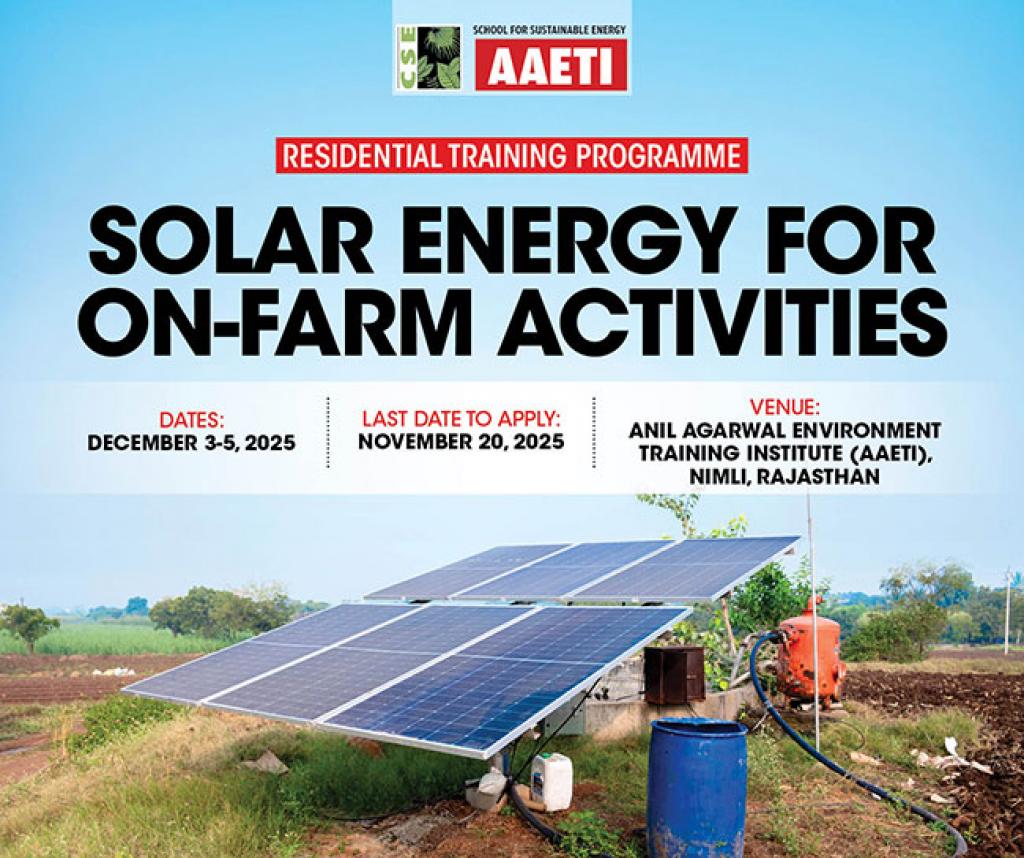Residential Training Programme on Solar Energy for On-Farm Activities
Registration Closed
India’s agricultural success relies on dependable water access, often disrupted by erratic monsoons. Solar water pumps have emerged as a game-changer, offering farmers an affordable, reliable, and sustainable solution. These pumps use photovoltaic technology to convert sunlight into electricity, ensuring a consistent daytime water supply. By eliminating dependence on costly diesel and unreliable grid connections, farmers can reduce input costs, improve productivity, and irrigate their fields on time.
However, challenges persist. The PM-KUSUM scheme, launched in 2019 to promote solar irrigation, has achieved only 30% of its target. Bridging the gap between policy and implementation is essential to meet the March 2026 deadline and to maximize benefits for farmers
To address these challenges, the Centre for Science and Environment (CSE) is organizing a three-day residential training programme, ‘Solar energy for on-farm activities. This programme will equip stakeholders, entrepreneurs, and technicians with the skills to understand the challenges, techno-economic feasibility, and financial viability of solar water pumping systems—empowering farmers to adopt clean energy solutions for more resilient and prosperous agricultural practices.
COURSE HIGHLIGHTS
- Impacts of solarising irrigation in agriculture
- Assessing water and energy requirements for irrigation
- Key components of solar water pumping systems
- Solar PV resource assessment methods
- Overview of support schemes
- Economic benefits for farmers and government
- Implementation challenges, solutions, and integration with other DRE systems
COURSE COORDINATOR
BINIT DAS
Programme Manager
Renewable Energy Programme, CSE
Mobile: +91 8093326269
Email: binit.das@cseindia.org
| Flyer | |
 |
|
| Download flyer | |
| Course fees | |
| Rs 22,000 (sponsorships/discounts available on fulfilling application criteria). The fee covers tuition, expert lectures, training materials, boarding and lodging, site visit, and transport between New Delhi and AAETI. Travel to and from Delhi must be arranged by the nominating authority or participants themselves. |
|
| Who Can Apply | |
| Officials from agriculture and irrigation departments, representatives of state nodal agencies, and members of village panchayats. Civil society organizations (CSOs), self-help groups (SHGs), and entrepreneurs are encouraged to apply. Additionally, farmers, FPO representatives, and other beneficiaries involved in decentralized renewable energy solutions are welcome to participate. | |
| Training Methodology | |
| Classroom lectures, case studies, class exercises, discussions, and field visit. | |
| Note: Registration is not a guarantee of acceptance of admission in the training programme. Limited seats available (a maximum of up to 20). | |
| PARTICIPANTS WHO COMPLETE THE TRAINING WILL BE AWARDED A ‘CERTIFICATE OF COMPLETION’ BY CSE. | |
| Anil Agarwal Environment Training Institute | |
 |
|
| Download here | Download here |
| Route Map for AAETI, Neemli, Rajasthan | |
| Weather in Nimli, Tijara, Rajasthan | |
Share this article